Redditor Gets Mad At Her Parents For Choosing To Go To A Football Game Instead Of Her Puppy's Birthday
It's always nice to have someone who is willing to help you at any time with whatever you need. Whether it's friends or family, you know you can rely on them, and that feeling is enough by itself.
Those pure relationships are rare nowadays, so if you have one of those, you should cherish and nurture it. Not everyone is fortunate enough to have one.
However, for this type of relationship, you need to give your time and trust to the other side as well. It can't work if it's not mutual.
Recently, a Reddit user shared her story about the kind of relationship she has with her parents. They live close by, and her parents help her a lot, but she also helps them.
One of the things she does for her parents is take care of their blind dog when they go somewhere because they can't take him with them due to his condition. However, the last time they asked her to dog-sit him, she refused.
She was available that night, so she could have done it, but she didn't want to. She explained that she also has a dog and had scheduled its birthday party for the same evening.
But even that wasn't the issue because they live very close. The problem was that she felt offended when her parents declined the invitation to her dog's party because they were planning to go to a football game.
She believes her dog's party is much more meaningful than a game, but her parents don't think so and call her behavior ridiculous.
Here is her dilemma:

They help and appreciate each other, but the last time, she had a reason for refusing to help them:

Her parents won't come to her dog's birthday party because they had planned to go to a football game.

Understanding Emotional Attachment to Pets
Research shows that pets can provide emotional support akin to that of human relationships, with studies indicating that pet owners often experience lower levels of loneliness and depression.
According to Dr. Alan Beck from Purdue University, the bond between humans and pets is profound, often leading to feelings of jealousy and disappointment when that bond is perceived as being undervalued.
This incident highlights how individuals may project their emotional needs onto pets, viewing them as integral family members deserving of celebration and attention.
But she views her puppy as her child, so she gets mad at them for choosing the game over his first birthday.
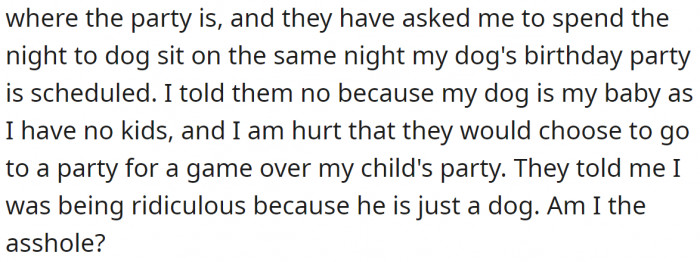
A Redditor suggested an acceptable solution:

But she explained why that option is not a possibility:

From a psychological perspective, the conflict arising from prioritizing a pet's birthday over a child's feelings can reflect deeper familial dynamics.
Attachment theory suggests that children may feel neglected if they perceive that their status within the family hierarchy is threatened, especially when parental attention is diverted to a pet.
Understanding this emotional landscape can help parents navigate their children's feelings more effectively, ensuring that all family members feel valued.
Another Redditor offered her another option:
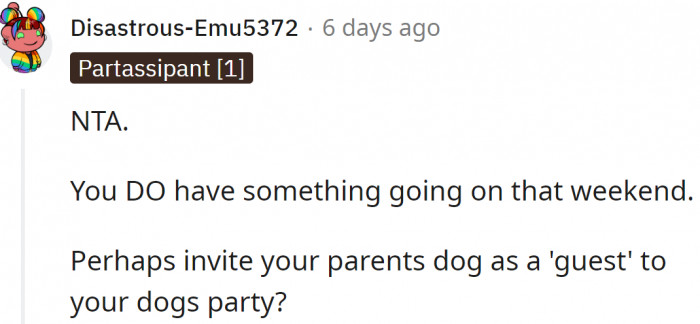
But she also received support for her logic:

One Redditor explained to her that she doesn't have the right to be mad at her parents:
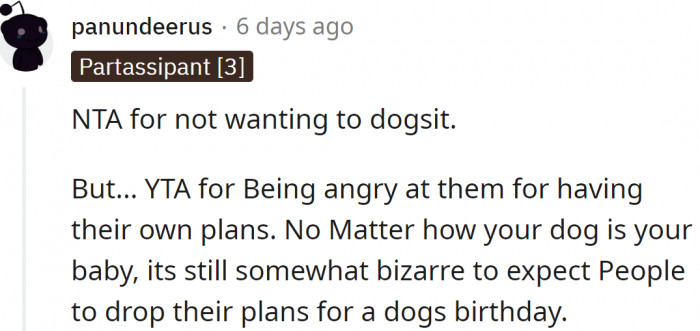
The Role of Communication in Family Dynamics
Effective communication is crucial in family relationships, particularly when it comes to setting priorities and understanding emotional needs.
Studies have shown that clear dialogue can mitigate feelings of resentment and misunderstanding, especially in families where pets are treated as equals.
Encouraging open discussions about feelings associated with pets can foster a more inclusive environment where every member feels appreciated.
"You could be flexible as the dog doesn't know the date."
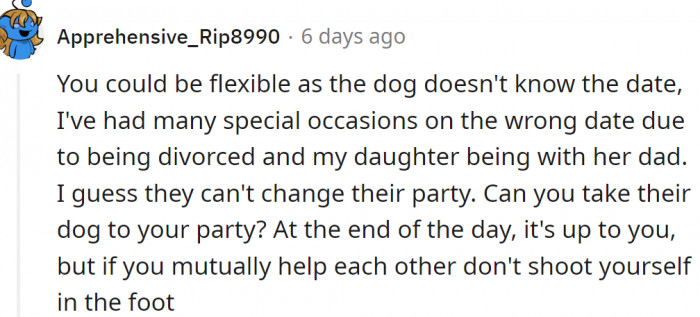
"I am kind of upset that they are choosing a football party over mine."
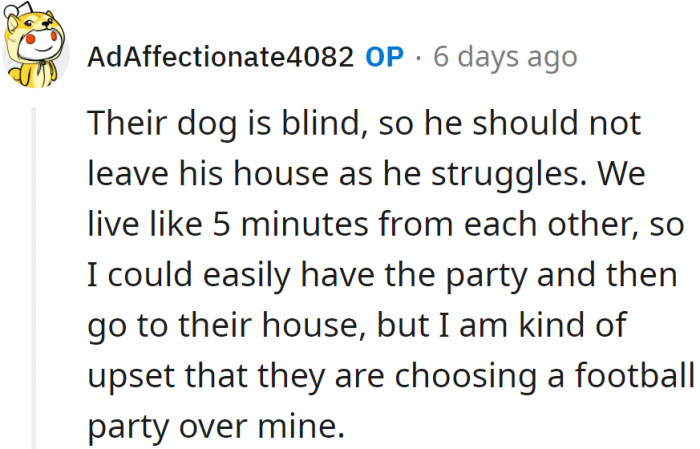
Here is an honest perspective:

Behavioral science emphasizes the importance of family rituals in strengthening relationships.
Creating special moments for both pets and children can help balance emotional investments and foster a sense of belonging in the family.
Strategies like scheduling family time dedicated to both children and pets can ensure that everyone’s emotional needs are met, reducing feelings of rivalry.
A lot of other Redditors advised her to change the date of the party. They believe it's a small issue that doesn't warrant a quarrel between them.
If it meant so much to her to have her parents present at the party, maybe she should have asked them if they were free that night first. It doesn't seem fair to expect them to change their plans for the night because of her puppy's party, even though she loves him like he's her child.
What would you do if you were in her place? Share your thoughts with us in the comment section below.
Empathy and Emotional Intelligence in Parenting
Building emotional intelligence in children is crucial for their development, especially regarding empathy and understanding others’ perspectives.
According to Dr. Marc Brackett from Yale University, teaching children to communicate their feelings and understand others’ emotions can significantly improve family dynamics.
Engaging children in discussions about the importance of pets and their own feelings can facilitate empathy, helping them understand why their parents may love the dog, but also why their feelings matter.
Psychological Analysis
This situation illustrates the complexities of emotional attachment in family dynamics, particularly as it pertains to prioritizing relationships.
It's common for individuals to feel overlooked when they perceive that emotional bonds with pets can overshadow their own needs, which can lead to feelings of jealousy or resentment.
Analysis generated by AI
Analysis & Alternative Approaches
These insights align with established research in family psychology, highlighting the importance of emotional validation in relationships. According to Dr. Shefali Tsabary, a renowned parenting expert, "Emotional validation is crucial for healthy family dynamics, as it fosters understanding and connection." Additionally, Dr. Harvey Karp, a pediatrician and child development expert, emphasizes that "acknowledging children's feelings can significantly enhance family interactions and strengthen bonds."



